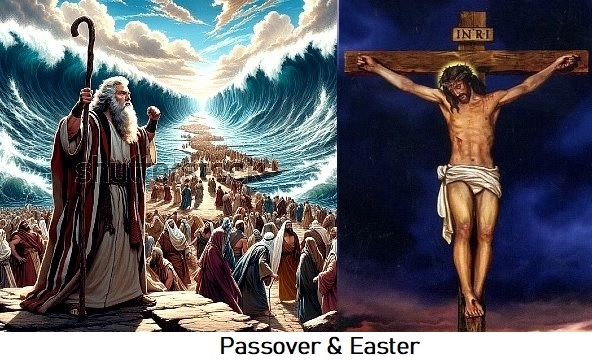Judaism & Christianity: Back To Basics
14 September 2024
Feast Date of The Exaltation of The Holy Cross
With so many books, documentaries and websites about the “Jesus Bloodline” it would be a good idea to reset the argument by presenting basic and common facts about Judaism and Christianity.
Let’s outline the differences between Judaism and Christianity.
Whereas in Judaism’s writing is right to left, and the beginning of the book is at the “back” (in reverse), the writing in Christianity is left to right and the beginning of the book is on the “front” (in reverse).
Whereas the Jews hold Saturday to be their holy day, Christians hold Sunday to be their holy day (in reverse).
Whereas in Judaism the day begins at Sundown, the day within Christianity begins from Sunrise (in reverse).
Whereas the dictum of Judaism is “Go Forth and Multiply”, Christianity teaches the very opposite. Whereas the Jewish Rabbi was expected to marry and to have children, the Priesthood within Christianity was the exact opposite, with sexual chastity regarded as being sacred. The role of the female within original Christianity was regarded as minor (misogyny).
The difference between Judaism and Christianity are these very opposites: the Old and the New Testaments, one belief being the culmination and the completion (Christianity) of the other (Judaism). Christians hold the Old Testament sacred because the New Testament is built upon Old Testament models (for which, see concordances of the Old and New Testaments).
The Exodus was not a historical event, just like the Crucifixion of Jesus Christ was not a Historical Event (vindication of this event cannot be historically verified). These two events are celebrated by the Passover and Easter.
The Jewish Sacred Meal is called the Seder, celebrated on the Saturday, and is done to celebrate the Passover; and is signified by the slain Sacred Lamb (signified by the first Full Moon during Spring), held to celebrate The Exodus. The Christian Sacred Meal of Easter is often the Lamb, commemorating the Crucifixion and sacrifice of Jesus Christ (a type of the Last Supper), celebrated on the Sunday, often eaten at midday, bringing the long fast of Lent to an end (signified by the first Full Moon during Spring).
The embryo, origin and nascent of what evolved into Christianity was the occupation of Judea by the Greeks and this was when the Jews were first Crucified (In 333 BCE, Alexander the Great conquered Judea on route to Egypt and Persia).
The sheer scale of ignorance and untrustworthiness of Christian Scholarship just cannot be overemphasised. It may want to brainwash and radicalise itself, but that does not mean the rest of us has to follow suit. Christian Scholarship operates in the way of a cartel – if people don't fit into its Pecking Order then they become systematically ridiculed as “ignorants” and excluded from its ranks. That's how Christian Scholarship operates – within such extreme hubris and arrogance – and maintains itself thus. Christian scholarship prides itself in its belief that the origins of the Gospels all date from the First Century. Christians did not mention the Gospels before the mid-Second Century. The oldest fragments of the Gospels are from the Gospel of John, dating from about the mid-Second Century (designated as Papyrus 45). The invention of the Gospels was responsible for hatching what became “Romantic Christianity”.
Whether or not Moses and Jesus Christ really historically existed – and whether or not The Exodus and The Crucifixion of Jesus Christ were really historical events – are not as important as understanding the reason for the differences between the two religions – and what really led to the origin of anti-Semitism. This is what really counts – and this is largely forgotten and is certainly not under discussion.
The reason why Christianity is not based in Jerusalem – but in the Vatican – is the explanation for the origin of anti-Semitism. The Christians became a part of the Roman Empire against the Jewish Revolts that were being carried out against the Roman Empire – because of the exclusion of Christianity by Judaism during that period of time.
The Crucifixion of Jesus Christ, originally celebrated during the First Century as being against the Roman Occupation of Judea (as a collective spiritual and Omnipotent supernatural power), became anti-Semitic when Jesus Christ was introduced as a Historical Figure within the Gospels – and was pro-Roman. This was why the Gospels date from the mid-Second Century. Pontius Pilate decided to crucify Jesus Christ but left the ultimate decision to the Jewish authorities.

|
